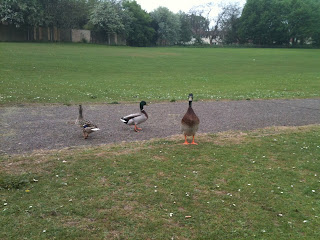Inclusivity in its basest form is ensuring that your organisation or company (in my case a university) doesn't unnecessarily exclude particular groups because of a practice or procedure. In order to develop an inclusive culture most organisations will need to identify the current groups that may be excluded, typically excluded groups (especially within a university) are students from BME backgrounds, those from lower socio-economic backgrounds and disabled students. On certain courses students from some religious groups, LGBT students and male and female students are under represented and work needs to be concentrated on their inclusion. This is all fairly obvious really. What has struck me in my discussions this week is the commonly held view that inclusivity means lowering standards. Even those people who believe strongly about building a more inclusive environment will often assume that this will in some way mean 'making it easier'.
For me inclusivity is not, and never should be, about lowering standards, if anything the reverse is true. If your standard of teaching and course content and delivery is good enough to reach a wider audience and not exclude people because of your approach then it is not only more accessible but richer and of a higher calibre.
This idea of 'lowering standards' really troubles me as it has the potential to undermine work around inclusivity culturally. We need to move away from this idea in order to avoid patronising highly talented students. We also need to look to ourselves more as educators of the diverse communities we work with and see this as a challenge to INCREASE our standards of quality not dumb them down.
All this talk of standards brought me to a further thought about how we measure a standard or a student's individual achievement. If you think about an 18 year old, white, male student from a relatively middle class background who has been through the education system and applies to a university to study a history degree - we will be able to track this student's progression statistically and it will look good. He will more than likely enter the university with the required entry grades and he will progress quickly as the familiar environment allows him to develop academically. On graduation we should see the student leave with a good 2:1 or first degree and therefore their student journey will represent a success for both the institution and the individual. It is all very nice. However consider the 35 year old single mother from a low income background. She has decided to give up her job and go back to university to retrain as a social worker. Her entry to the course will be through access qualifications and her previous experience of education is quite negative. She graduates with a third degree but her experience at university and her achievement of a degree has had a transformative impact on her life and that of her child. However statistically she is not a success.
These are fairly stereotyped and cras examples and there is nothing to say that the student in the first example may leave or drop out and the second achieve a first class honours. However, they are useful examples in this debate of inclusivity. I am interested in the way that we measure success and the impact of a higher education qualification on students who are typically excluded. If we are in the business of transforming people's lives of shaping and supporting communities and of creating excellence who is the best example of this and how could we measure this more accurately?
How can we promote this transformation of people's lives, how can we see success as the process by which someone has obtained their degree rather than just assessing the final outcome using a system that entrenches pre-established prejudice?
By finding a rigorous way of doing this we also get to demonstrate how much a university is able to put back into its community and is not an elitist playground for the educationally privileged.


